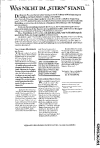German tobacco industry's successful efforts to maintain scientific and political respectability to prevent regulation of secondhand smoke
- PMID: 16565444
- PMCID: PMC2563568
- DOI: 10.1136/tc.2005.012336
German tobacco industry's successful efforts to maintain scientific and political respectability to prevent regulation of secondhand smoke
Abstract
Objective: To examine the tactics the tobacco industry in Germany used to avoid regulation of secondhand smoke exposure and to maintain the acceptance of public smoking.
Methods: Systematic search of tobacco industry documents available on the internet between June 2003 and August 2004.
Results: In West Germany, policymakers were, as early as the mid 1970s, well aware of the fact that secondhand smoke endangers non-smokers. One might have assumed that Germany, an international leader in environmental protection, would have led in protecting her citizens against secondhand smoke pollution. The tobacco manufacturers in Germany, however, represented by the national manufacturing organisation "Verband" (Verband der Cigarettenindustrie), contained and neutralised the early debate about the danger of secondhand smoke. This success was achieved by carefully planned collaboration with selected scientists, health professionals and policymakers, along with a sophisticated public relations programme.
Conclusions: The strategies of the tobacco industry have been largely successful in inhibiting the regulation of secondhand smoke in Germany. Policymakers, health professionals, the media and the general public should be aware of this industry involvement and should take appropriate steps to close the gap between what is known and what is done about the health effects of secondhand smoke.
Conflict of interest statement
The authors have no competing interest to disclose.
References
-
- Lickint F. Tabak und Tabakrauch als aetiologischer Factor des Carcinoms. Zeitschrift fuer Krebsforschung 1929(30)349–365.
-
- Neuman M, Bitton A, Glantz S. Tobacco industry strategies for influencing European Community tobacco advertising legislation. Lancet 20023591323–1330. - PubMed
-
- Lehman K. Chemische und toxikologische Studien über Tabak, Tabakrauch und das Tabakrauchen. Archiv für Hygiene 190968321–420.
Publication types
MeSH terms
Substances
Grants and funding
LinkOut - more resources
Full Text Sources
Medical
Miscellaneous


